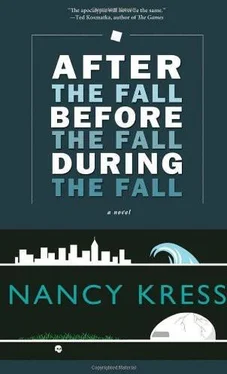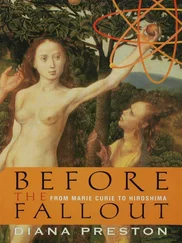He said, “You come with top-level recommendations from people I’m not at liberty to name. You understand why not.”
“Of course.” He was name-dropping by not dropping any names, and he was out to make his own reputation. Nonetheless, curiosity was rising in her about the nature of the project for which he wanted predictive algorithms. He was a researcher in biology, after all—not usually the stuff of intense secrecy unless you were involved in genetic engineering or pharmaceutical research, which he was not. She’d checked him out. Two published articles so far, both on the geographical distribution of weeds nobody ever heard of, or cared about since the weeds were not edible, threatening, invasive, or endangered. The statistical analyses in both articles struck her as sloppy. But he was old money, Harvard, Skull and Crossbones—all the things that gave one contacts in high places.
His office was the usual thing for academics just starting to climb the university ladder: small, dark, crowded with metal shelves holding messy piles of papers, binders, folders, books. A scuffed wooden desk and two chairs. Still, he wasn’t housed in the building’s basement with the teaching assistants, his office had a window, and on the wall hung an expensively framed photo of young men crewing on the Charles River.
Julie shifted on her chair. Beneath her maternity bra and thick sweater, she felt her breasts begin to leak. Alicia was a hungry little milk demon. Julie tried not to be away from her for more than a few hours at a time, for both their sakes.
Dr. Geoffrey Fanshaw pursed his lips theatrically, studied her, and nodded several times, as if making a decision that clearly had been made before. With a flourish suited to a bad Shakespearean actor, he handed her a sheaf of papers, then rose to lock his office door.
Ten minutes later Julie sat in shock, staring at him.
“How did you come by this information?”
“I told you that I can’t say.” He puffed with importance instead of what he should have felt: fear.
“The data on the simultaneous appearance of the altered Klebsiella planticola on three separate continents—you’re sure of its authenticity?”
“Absolutely.”
“And its accuracy?”
“Yes.”
“Have you personally visited any of these sites? The Connecticut one, maybe?”
Annoyance erased his habitual smirk. “No, not yet. New Zealand and Brazil, of course, would be difficult to get to. And—”
“But,” she burst out, unable to restrain herself, “what is anybody doing about this?”
“I don’t know. My concern is publishing on-line with the predictive algorithms in place as soon as the story blows in the press. Which can’t be too long now—some smart journalist will get it. As soon as that happens, I want to be poised to publish in a professional journal with some prominence.”
Julie heard what Fanshaw wasn’t saying: he wanted to be the instant go-to guy for the news shows, talk shows, sound-bite seekers. A professor, personable, well-connected, first to publish a serious analysis—he’d be a natural. He wanted the 60 Minutes interview and the Today show discussion, and to hell with the fact that in three widely separated locations around the planet—three known about now, who was to say there weren’t actually more—a deadly bacterial mutation was killing the roots of plants through an alcoholic by-product. Drowning them in booze. A bacterium found on the roots of virtually every plant on Earth except those growing in or near brackish water.
Fanshaw said eagerly, “Can you do the statistical analysis?”
She managed to get out, “Yes.”
“By when? I need it, like, yesterday.”
“I’ll start this afternoon.” The statistical part wasn’t hard. There must be mathematicians—not to mention biologists!—working frantically on this around the globe. Fanshaw was right—the press would get this very soon. And if—
The fuller implications hit her.
“If this isn’t natural— three locations for a naturally occurring identical mutation just doesn’t seem likely. Even an accidental release of a created genetic mutation would only happen in one place. So is this a terrorist attack?”
“I don’t know.” For a second he looked almost concerned, but that washed away in a fresh surge of self-obsession. “As I said, Dr. Kahn, time is of the essence, I need those algorithms.”
“Yes.” She stood, unable to stand him one minute more.
On her way to the parking lot, breasts leaking milk with every step, she passed summer-term students hurrying to class, chatting on a low wall, sprawled on the grass over open books or laptops. Despite herself, she stopped to gaze at a flower bed, unable to look away. Pansies, impatiens, baby’s breath.
Nearly every plant on Earth.
Who? And in the name of every god she didn’t believe in— why?
McAllister and Tommy McAllister were the only ones who believed Pete had been Outside. Tommy was angry because Pete hadn’t taken him along on the “adventure.” McAllister was tense with hope. “Tell me again,” she said.
They sat alone in her room. Pete avoided looking at the curve of her belly. Again he recited everything that had happened, too frightened at what he himself had done to leave anything out, not even the cause of the fight with Ravi. But that wasn’t what she was interested in.
“You saw bushes and grasses. Trees?”
“No.”
“Animals?”
“No.”
“And you could breathe.”
“It was a little hard.”
“Like you weren’t getting enough air?”
“Yeah. But not very bad.” How could that be? There had been air all around him, blowing gently as it never did inside the Shell.
She guessed the question he wasn’t asking. “You had trouble breathing because the air mix still isn’t right out there. Maybe there’s too much CO 2—the destruction of the Earth’s forests would have really screwed up the oxygen-carbon dioxide balance. Maybe too many volcanic particles still, maybe toxins, maybe too much methane. I don’t know. I wasn’t an ecologist. But I think the atmosphere was becoming unbreathable when the Tesslies put us into the Shell. And now you could breathe it.”
“Does that mean they’ll let us out soon?”
McAllister raised both hands, let them drop, screwed up her face. Her pregnancy had made her more emotional, which everyone had observed and Pete did not understand. Was that usual? “Pure foolishness, getting herself knocked up at her age,” Darlene had said. “Who does she think she is, Abraham’s Sarah?” Caity bit her lip and looked away every time McAllister waddled into a room. Pete was just glad he wasn’t female.
McAllister said, “How should I know what the Tesslies will do?”
Pete burst out, “I’ll kill them if I can!”
She didn’t answer that; they both knew it was too ridiculous. Instead she said yet again, “And you couldn’t tell if the Tesslie was a living being inside a space suit or a robot.”
“I don’t know.”
She smiled. “Neither did I, the one time I saw one.”
“How did it get here?”
“I don’t know, dear heart. Until the Grab machinery appeared, I assumed they’d all left Earth after putting us Survivors in the Shell. After all, nobody had seen one for twenty years. But either they returned or else they were observing us all along.”
Pete had known they watched him! Fucking bastards—
McAllister said, “Thank you, Pete. You can go now, but later I want to talk to you and Ravi together.”
“I’ve got Grab duty.”
“Do you want someone else to take it?”
“No.” He made himself ask, “Is Ravi all right?”
Читать дальше












